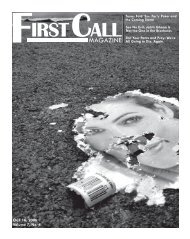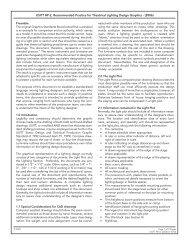<strong>Penn</strong> <strong>Philosophical</strong> <strong>Perspectives</strong>that not only does the idea <strong>of</strong> blessedness run counter to theStoic conceptions <strong>of</strong> happiness and virtue, it is also inconsistentblessedness as happiness plus good fortuneintroduces a higher form <strong>of</strong> happiness. This type <strong>of</strong> happiness<strong>of</strong> good fortune (something typically out <strong>of</strong> one’s control) leads--<strong>of</strong> thought becomes obvious; external goods, precisely becausethey have the ability to render a higher state <strong>of</strong> happiness, ac- Thus, if one wishes to remain committed to the original criterianotion <strong>of</strong> blessedness. that the proposed limitations are, in part, unwarranted. For in-blessedness is simply a different typedifferent type <strong>of</strong> happiness as opposed to a higher level <strong>of</strong> hap---same reasons mentioned in defense <strong>of</strong> the criteria themselves,thought that excludes the possibility <strong>of</strong> other types <strong>of</strong> happiness(at least for those who hold the original criteria to be sound).Other Counters and Responses (seemingly) counterintuitive nature <strong>of</strong> the Stoic disposition inexternal goods. It is absurd, some critics suggest, to maintainthat someone is to remain emotionless and unaffected when heor she suffers misfortunes like those <strong>of</strong> Priam. Such a state <strong>of</strong>being seems impossible and inhuman.The problem with this criticism is that it arises from a misunderstanding<strong>of</strong> a key component in Stoic philosophy. TheStoics, for the most part, do not completely disregard the value(or should not) have the ability to weigh against one’s happi-happiness, is grounded in moral virtue. Someone in Priam’sposition would perhaps experience a period <strong>of</strong> psychologicaldisturbance and unrest when all <strong>of</strong> his preferred indifferents, theconditional goods, are taken away. Ins<strong>of</strong>ar as he was a virtu--January 2010Perhaps another example will clarify the Stoic position. -would not kill another person for a healthy heart even in anattempt to preserve his own health; doing so would require thathe carry out an immoral act, and the chief concern <strong>of</strong> the Stoicis to avoid such occurrences. Thus, even though the Stoic doesvalue the external good (e.g., health) to some extent, this type<strong>of</strong> value can never weigh against moral virtue (a different typethe Stoic attitude towards external goods does not appear to becompletely counterintuitive.Conclusion Stoic arguments regarding the nature <strong>of</strong> human good. The Sto-pinessto argue that happiness is not dependent on externals(e.g., health, wealth, etc) in that, if it were dependent on suchthoughhe presents this conception <strong>of</strong> happiness at the outset <strong>of</strong>Nicomachean Ethicsblessedness. He holds that when a virtuous person experiencesmisfortune and the loss <strong>of</strong> external goods, he or she remainshappy but fails “to reach blessedness.” From this explanation,blessedness is happiness plus good fortune, and as such, it can<strong>of</strong> this notion, however, reveals that if one reaches this higherstate <strong>of</strong> happiness by obtaining external goods (i.e., by experiencinggood fortune), then this conception <strong>of</strong> happiness is nohappiness is life in accordance with moral virtue, bestowing nodirect reliance on external goods.Works CitedThe Nicomachean Ethics Cicero. On Final Ends Cicero. On GoalsHellenistic Philosophy radioactive-happiness-face.gifIntroductory Readings. 2nd ed. Indianapolis: HackettPublishing Company.Sextus EmpiricusHellenistic Philosophy25 26
On the Philosophy <strong>of</strong> MetaphorsAn Interview with Dr. Elisabeth Camp<strong>Penn</strong> <strong>Philosophical</strong> <strong>Perspectives</strong>Christina Matthias<strong>University</strong> <strong>of</strong> <strong>Penn</strong>sylvaniacmatthia@sas.upenn.eduDr. Elisabeth Camp is a philosopher <strong>of</strong> language andmind, whose research focuses on thoughts and utter- this interview, she discusses her path to becoming aphilosopher, and about the philosophy <strong>of</strong> metaphors.The paper she discusses here can be found on her website:http://www.sas.upenn.edu/~campe/#papersDr. Camp received her PhD from UC Berkeley, andcompleted postdoctoral research at Harvard. She isnow an Assistant Pr<strong>of</strong>essor <strong>of</strong> Philosophy at U<strong>Penn</strong>.-I wanted to do something else. So I took a philosophy classwhich I thought might be the next best thing. I was a doubleabout fully committing to philosophy; I really enjoyed it andI found it really hard. I always thought it was just somethingI enjoyed, so I worried it was self-indulgent. I then went andworked in Chicago in adult literacy for three years after college.During that time, among the various things I was doing wasworking with people in the Latino community who were learn-and this phrase not a good phrase, and how can we manage tocommunicate these complex things? So that started to get meto see that it can actually matter, and not just be a fun game.stuff enough to go to grad school, but even then, I thought Iso many more topics that I thought were really interesting, andnot just things that were taught in my classes. I started coming-can actually help other people learn how to think, by teachingphilosophy, so I started to be corrupted.Where did most <strong>of</strong> your experience with neuroscience andJanuary 2010There was this reading group in grad school, post-docs andfaculty. It brought together philosophers who were interestedin psychology, and psychologists and cognitive scientists whoabout concepts, about representation, some about the cognitivearchitecture, like how must thoughts and thinking be substan-much overlap there was, but also how much difference there all trying to talk about the same thing, but the psychologists areconcepts, how do they connect to substantiation, how is it thattions<strong>of</strong> using this concept correctly and incorrectly, and wheremore concerned about reference. Philosophers are much moreconcerned with how a concept connects up to the world, andthe psychologists are much more concerned with just what isgoing on inside the head. It was really interesting to see, givenhow much we thought we were agreeing, where we would justdisagree.interested in metaphor, and in the difference between metaphorjorbecause I was interested in that area. From there, I feel likethat has branched into a lot <strong>of</strong> different things about the ways26
















